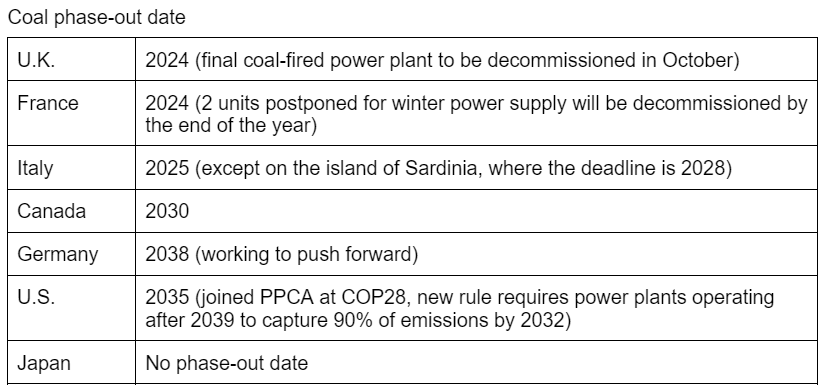On June 14, 2024, G7 leaders released a communiqué summarizing the outcomes of the G7 Summit held in Apulia, Italy, from June 13-15, 2024. Notable in this year’s communiqué was, for the first time in a top-level G7 agreement, the setting of a coal phase-out target with a commitment from leaders to phase out unabated coal-fired power generation during the first half of the 2030s.
In the communiqué from last year’s G7 Ministers’ Meeting on Climate, Energy and Environment held in Sapporo, a timeline for phasing out coal-fired power generation was not specified due to strong opposition from Japan. This year’s G7 agreement to “phase out existing unabated coal power generation in our energy systems during the first half of 2030s or in a timeline consistent with keeping a limit of 1.5°C temperature rise within reach, in line with countries’ net-zero pathways” can be considered a step forward, but considering the increasingly urgent need to address climate change, the first half of the 2030s will inevitably be criticized as being too late.
Reluctance from Japan
Among the G7 countries, Italy, the United Kingdom, France, Germany, and Canada have announced an exit from coal by 2030, and at 2023’s COP28 conference, the U.S. joined the Powering Past Coal Alliance (PPCA), which aims to phase out existing coal-fired power plants by 2030. On April 25, 2024, the U.S. Environmental Protection Agency (EPA) announced final carbon pollution standards that require existing coal-fired power plants planned to operate in 2039 to have measures in place to capture 90% of their CO2 emissions from 2032.
However, Japan still has not clearly set a date for a coal-fired power phase-out and remains the only G7 country to not become a member of the PPCA. It has also been reported that at this year’s G7 summit as well, Japan expressed difficulty in specifying a date for a coal exit in the communiqué. Japan is increasingly lagging behind the international movement to withdraw from coal, particularly in Europe.

Japan should recognize international understanding of “abatement”
There is concern that Japan has left a loophole to continue coal-fired power generation based on its own interpretation of “in line with countries’ net-zero pathways” in the communiqué. The Japanese government insists that co-firing coal with hydrogen/ammonia, which do not emit CO2 when burned, meets the definition of “abatement”. According to the IPCC Sixth Assessment Report (AR6), ‘unabated fossil fuels’ refers to fossil fuels produced and used without interventions that substantially reduce the amount of GHG emitted throughout the life cycle; for example, capturing 90% or more CO2 from power plants (Working Group III Report).
However, it is substantially difficult to meet this level of emission reductions through hydrogen/ammonia co-firing. Some power utilities have begun a demonstration experiment of co-firing 20% ammonia at a large-scale power plant, but it has been pointed out that not only does ammonia emit a large amount of CO2 in the manufacturing process, but also that the emission reductions from co-firing is severely limited, and this interpretation has not gained international recognition.
Furthermore, even if green ammonia (ammonia that does not emit CO2 throughout its life cycle, including during production) becomes available, technical and time-related issues still prevent it from meaningfully reducing emissions in time; mono-firing of either hydrogen or ammonia is not expected to be available until 2050. Japan should not promote so-called “abatement” based on the pretense of reduction effects from technologies that have not yet been developed.
Will the revised Strategic Energy Plan reflect the G7 agreement?
In the 6th Strategic Energy Plan, coal is stated as an “important energy source” and is expected to account for 19% of Japan’s domestic energy mix in 2030. According to the Agency for Natural Resources and Energy, in FY2022, coal accounted for 30.8% of energy in Japan, with fossil fuels in total accounting for 70% of the country’s total annual electricity generation. Although the share of renewable energy is increasing, its share in FY2022 was only 27.2% (solar, hydro, etc. combined) and requires rapid expansion. Since the focus of discussions related to the 7th Strategic Energy Plan will be on how to set targets for the country’s energy source composition from FY2035, we need to pay attention to how the agreements reached at this year’s G7 summit, and the renewable energy targets agreed to at COP28, will be reflected in the revised Strategic Energy Plan.
In order to accelerate the transition to a decarbonized society, Japan must change its passive stance on exiting coal, and drop its unrecognized definitions of “abatement” that will only lead to the prolongation of coal-fired power generation.
Reference:
Climate, Energy and Environment Ministers’ Meeting Communiqué (PDF)
Press conference of the G7 Summit (Link)
Apulia G7 Leaders’ Communiqué (PDF)

